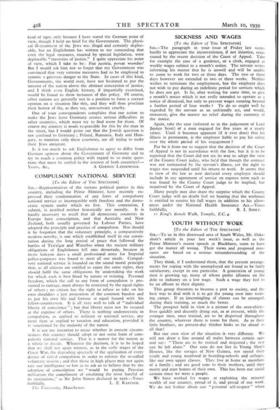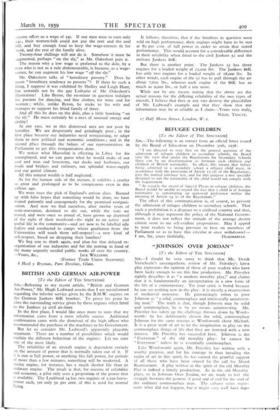YOUTH WITHOUT WORK
[To the Editor of TIM SPECTATOR] SIR,—TO us in this distressed area of South Wales, Mr. Oake- shott's article in your last week's issue, as well as the Prime Minister's recent speech at Blackburn, seem to have got the matter all wrong. Their views and proposed mea- sures are based on a serious misunderstanding of the situation.
They think, if I understand them, that the present arrange- ments for coping with the unemployed are found to be fairly satisfactory, except in one particular. A generation of young men is growing up, many of whom prefer idleness on the dole to industry on a low wage. Such a wage they feel to be an affront to their dignity.
This group threatens to become a pest to society, and the best way to deal with it is to get the young men into train- ing camps. If an intermingling of classes can be arranged, during their training, so much the better.
The prospect held in view is a picture of the over-thirty- fives quickly and decently dying out, as at present, while the younger men, once trained, are to be dispersed throughout the country, wherever there is room for them. As to their little brothers, no present-day thinker looks so far ahead as all that!
But our own view of the situation is very different. We will not draw a line around all males between certain ages and say : "These are to be trained and migrated ; the rest can be left alone." Our sons do not live in Young Men's Houses, like the savages of New Guinea, nor spend their youth and young manhood in boarding-schools and colleges, like our own upper classes. They live at home as members of a family ; and are good sons to their mothers, until they marry and start homes of their own. This has been our social custom since we were a people.
We have worked for wages at exploiting the mineral wealth of our country, proud of it, and proud of our work. We do not bother about our "personal self-respect" when anyone offers us a wage of 24s. If our men were to earn only their women-folk could not pay the rent and the coal bill, and buy enough food to keep the wage-earners fit for work, and the rest of the family alive.
Twenty-four shillings will not do it. Somehow it must be augmented, perhaps "on the sly," as Mr. Oakeshott puts it.
The reason why a low wage is preferred to the dole, by a man who is not as a rule dishonourable, is because, as a wage- earner, he can augment his low wage "off the sly."
Mr. Oakeshott talks of "hereditary poverty." Does he mean "hereditary tendency to poverty "? If there be such a thing, I suppose it was exhibited by Shelley and Leigh Hunt, but certainly not by the gay Lothario of Mr. Oakeshott's illustration! Like Byron, the ex-miner in question indulges his passion for dancing, and fine clothes, for wine and for women ; while, unlike Byron, he sticks to his wife and manages to support his blind family of three.
And all this he does on the dole, plus a little hawking "on the sly." He must certainly be a man of unusual energy and ability!
At any rate, we in this distressed area are not poor by heredity. We are desperately and grindingly poor ; in the first place because our industries need reorganising, to adapt them to new political and economic conditions ; and in the second place through the failure of our representatives in Parliament to get this reorganisation done.
We notice what Mussolini is effecting in Libya for his unemployed, and we can guess what he would make of our coal and iron and limestone, our docks and harbours, our roads and bridges and railways, our splendid water-supply and our genial climate.
All this natural wealth is half neglected.
As for the human side of the picture, it exhibits a cruelty so great and prolonged as to be conspicuous even in this callous age.
We were once the pick of England's artisan class. Buoyed up with false hopes that something would be done, we have waited patiently and courageously for the promised reorgani- sation. And now we find ourselves, after twelve years of semi-starvation, destined to die out, while the sons we reared, and were once so proud of, have grown up deprived of the right of their manhood—the right to an active and useful life in the community--and are now to be labelled idle loafers and conducted to camps where gentlemen from the Universities will teach them self-respect!—a new kind of self-respect, based on dropping their families!
We beg you to think again, and plan for that delayed re- organisation of our industries and for the putting in hand of the many urgently needed public works all over the country.
--Yours, &c., JACK WILLIAMS
(Former Trade Union Secretary).
8 Heol y Bryniau, Pant Dowlais, Glam.











































 Previous page
Previous page